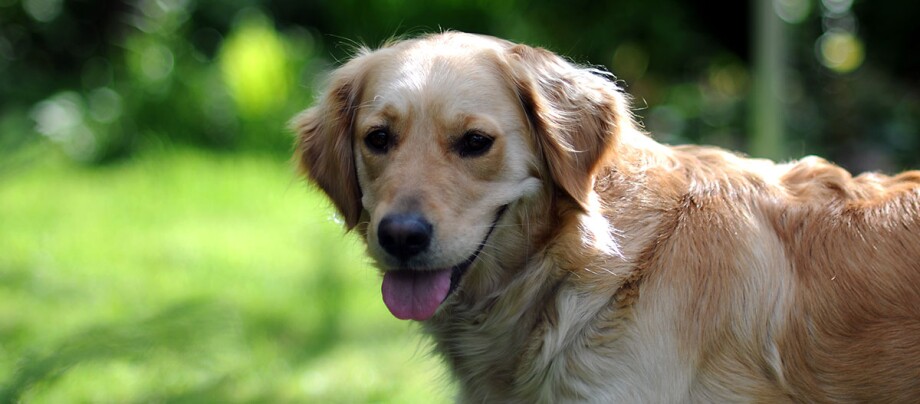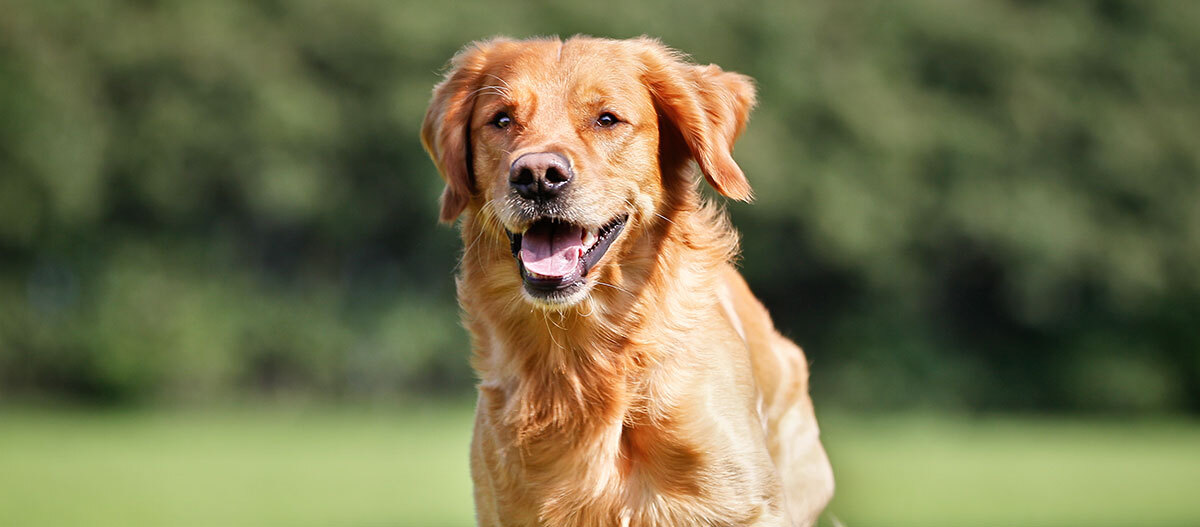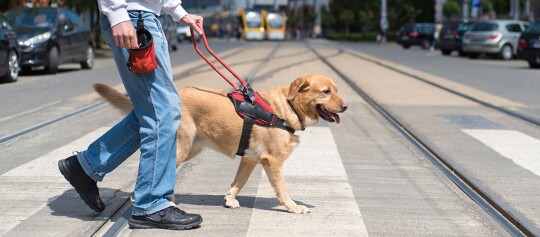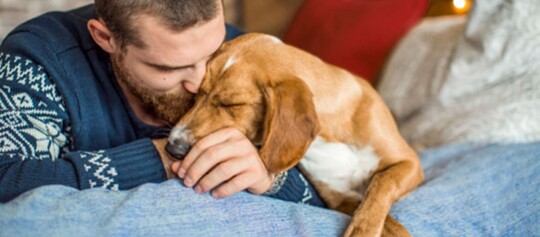Golden Retriever – smart and loyal companion from Scotland
18.02.2024 - Reading time: 9 minutes

Are you looking for a dog with a friendly nature, who is both obedient and trusting and will enjoy joining in activities with you? Then the Golden Retriever is perfect for you. Golden Retrievers make intelligent, lovable companions.
- A smash hit: from retriever to agility fan
- Character and temperament: Is a Golden Retriever a good dog for first-time owners?
- Golden Retriever profile
- How much exercise does an Golden Retriever need?
- What age will a Golden Retriever live to?
- Training and looking after a Golden Retriever
- Feeding a Golden Retriever
- Caring for a Golden Retriever
- What to consider when buying a Golden Retriever
- How much does a Golden Retriever cost?
A smash hit: from retriever to agility fan
The development of firearms allowed hunters to kill game even at long distances. This meant that they needed different qualities in their dogs: the animals needed to be able to bring back shot prey safely and over longer distances. This marked the beginning of the age of the Golden Retriever, a dog that we owe to the breeding efforts of the Scottish Baron Tweedmouth from 1864 onwards. The nobleman crossed Wavy-Coated Retrievers, Tweed Water Spaniels and Irish Setters. The Golden Retriever owes its talent for retrieving to these ancestors. The Golden Retriever has been an officially recognised breed since 1913. It belongs to FCI group 8, section 1: Retrievers. Its drive and intelligence make it a sought-after colleague by the police, rescue services and drug enforcement agents. Thanks to his friendly, people-oriented nature, it also makes a wonderful therapy dog and companion dog for working with people with disabilities. But the Golden Retriever is also born to be a loyal and loving family dog and is equally devoted to every member of the family.
Character and temperament: Is a Golden Retriever a good dog for first-time owners?
The Golden Retriever is not usually an aggressive or fearful dog: its temperament is characterised by its friendliness and kindness. It also gets on exceptionally well with other dogs. It also has a strong desire to please its owners. The Golden Retriever achieves this not only through its endearingly trusting nature, but also through its desire to work and its willingness to obey. It is therefore a good choice even for first-time owners. However, the Golden Retriever is not sharp enough to be a guard dog. One small character flaw is its greediness. Thanks to its well-rounded nature, the Golden Retriever is rarely frantic or nervous. It is precisely these characteristics that allow it to focus on doing its job with precision. It is also very quick to learn. Working as a therapy dog, guide dog for the blind or sniffer dog for the police are therefore ideal ways for it to express its intelligence and obedient nature. In a family setting, you get a happy, trusting dog that is not easily bothered by anything. With the right leadership, the Golden Retriever will not show dominant behaviour or try to assert itself over others. Its patient, playful nature therefore make it an ideal family dog. Nevertheless, a dog is not a toy, nor is it a four-legged babysitter. Every animal has its own needs and children should be taught to respect these from the very beginning.
NewsletterGolden Retriever
Breed | Golden Retriever |
Origin | Great Britain |
Classification | Retriever |
Size | Males 56 to 61 cm at shoulder height – females 51 to 56 cm at shoulder height |
Weight | Males 30 to 40 kg – females 25 to 35 kg |
Physical build | balanced and well proportioned, strong bones |
Eyes | dark, loving expression |
Ears | medium size, set at eye-height and floppy |
Coat and colour | weatherproof coat, flat or wavy with dense undercoat and feathering on legs and tail; golden tones. |
Special features | loves water, sheds lightly all year round |
Nature | loving, trusting, keen to work |
Care | brush once a week, or daily when shedding |
Health | prone to obesity, arthrosis, susceptible to epilepsy due to breeding, hypothyroidism and food allergies |
We have the best products for your Golden Retriever!
How much exercise does an Golden Retriever need?
Long walks and exercise are a must if you want your Golden Retriever to maintain its loving and well-rounded character. This intelligent and eager dog needs to be challenged both mentally and physically. Dog sport such as agility, flyball and obedience are good ways to challenge your dog. In order to stimulate your dog’s intelligence and satisfy its need for play, you need a varied selection of fetch and action toys. Search and tracking games are other welcome alternatives. You would do well to carry a towel with you when out and about: The Golden Retriever absolutely loves water and if it sees water, there will be no stopping it. After all, in the 19th century this breed was used especially for hunting ducks and game birds. It had to jump into the cool water in all seasons to retrieve the shot birds.
What age will a Golden Retriever live to?
A healthy Golden Retriever has an average life expectancy of eleven years. However, it is not possible to clearly predict the age to which a Golden Retriever will live. Some individuals live to be more than eleven years old, while others die prematurely due to illness. Scientists found that obesity reduces animals’ life expectancy by around 20 percent. They studied Labrador Retrievers and found that the average life expectancy of dogs of normal weight was about two years longer than that of obese dogs. So if you want to help your Golden Retriever live as long as possible, help it to maintain an ideal weight throughout his life. The same applies if you decide to get a Golden Retriever mix. A cross between a Golden Retriever and a Labrador, for example, is a popular choice. This type of Golden Retriever mix is known as a Goldador.

Training and looking after a Golden Retriever
The size of a Golden Retriever varies depending on sex. They measure 51 to 61 centimetres at shoulder height and weigh 25 to 35 kilograms. It is also a medium-sized dog that requires a certain amount of space.
Ideally, your Golden Retriever should have free access to the garden or property, should not be left by itself for long periods of time, and should be able to form a close bond with its owners. This breed is not the right choice for anyone looking for a guard dog for their home or yard. It greets strangers with the same positive, open attitude as it does other dogs and animals. It is therefore not at all suited to living in a kennel.
A Golden Retriever should be trained with love and consistency to channel the dog’s hunting instinct in appropriate ways. Despite its friendly nature, it is important to train the Golden Retriever consistently from an early age. This is how you will build the foundations for a happy life together with your dog. You can nurture its natural talents with plenty of retrieving games and agility sports.
Feeding a Golden Retriever
Despite being athletic and active, the Golden Retriever can quickly become overweight and obese. As obesity is known to cause joint and health problems, you should make sure that your dog is being fed a balanced diet. As this breed is considered to be particularly greedy, you must make it clear to your puppy that begging and unwanted foraging outside are not permitted. This will prevent your Golden Retriever puppy from piling on excess pounds, which can negatively affect their health in adulthood or even earlier. Training snacks and treats should also always be deducted from its daily calory intake.
Caring for a Golden Retriever
This breed has a straight or wavy, water-resistant coat. All shades of gold or cream are accepted coat colours; some white hairs on the chest of the Golden Retriever are also permitted. Caring for a Golden Retriever’s coat is easy. Brush your dog twice a week, or daily when shedding. Ears and teeth should also be meticulously cleaned to prevent inflammation. This dog is fairly cold-hardy thanks to its undercoat, but the summer heat can be more challenging. Golden Retrievers have a healthy appetite and are prone to obesity and subsequently symptoms such as arthrosis. In recent years the Golden Retriever has grown in popularity as a fashionable dog. Due to the growth in demand, there has unfortunately also been an increase in negligent breeding. So, if you are looking to buy a Golden Retriever puppy, make sure to choose a reputable breeder.
What to consider when buying a Golden Retriever
Due to the Golden Retriever’s friendly appearance, great character traits, intelligence and loving nature, it is hardly surprising that it has become a fashionable dog to own. But when demand is high, the number of dogs being carelessly bred by unscrupulous breeders increases in a bid to satisfy the demand for this popular breed as quickly as possible, for maximum profit. A good Golden Retriever breeder, on the other hand, behaves responsibly and shows a genuine interest in their puppies’ new owners. So, do not be surprised if they ask you some questions. After all, they only want to make sure that their puppies will be set up for success in life. The breeding of only healthy parents, a contract of sale and a health check with vaccinations are standard. Visit the Golden Retriever puppy a few times before you finally take it home, meet the parents and ask the breeder any questions that you might have. Also make sure you that have a clear idea of what the kennel is like and how well the animals are socialised. The puppy should already be familiar with the hoover, a collar, children, strangers and car rides.
There is one more thing you need to consider: Just like the Labrador Retriever, Border Collie, Australian Shepherd and many other working dog breeds, Golden Retrievers belong to one of two lines. The lighter, more athletic working line focuses on the animals’ capabilities. This line is ideal for hunting and extensive dog sports. The show line is of a calmer disposition, more well-rounded, and more compact and heavier in build. The breeders of this line focus not only on show success, but also on the character traits expected of a loyal, loving family companion that does not have the same intense desire to retrieve or hunt.
How much does a Golden Retriever cost?
If you are looking to get a Golden Retriever, you can visit an animal shelter or contact a reputable breeder. You can expect to pay a reputable breeder 1,000 to 2,500 euros on average for a pedigree dog, although the price can, of course, vary depending on the breed and the breeder. If getting a dog from an animal shelter, you only need to pay a rehoming fee, which is around 200 to 300 euros on average. However, ensuring that your Golden Retriever comes from a responsible, reputable source is more important than the price.

